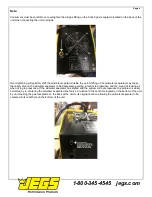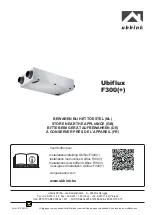
Page 2
Cutting processes pose certain inhalation risks. Be sure to follow any guidelines from your chosen consumable
and electrode suppliers regarding possible need for respiratory equipment while cutting. Always cut with
adequate ventilation. Never cut in closed rooms or confined spaces. Fumes and gases re-leased while cutting
may be poisonous. Take precautions at all times.
Any burning of the eyes, nose or throat are signs that you need to increase ventilation.
Stop immediately and relocate work if necessary until adequate ventilation is obtained.
Stop work completely and seek medical help if irritation and discomfort persists.
WARNING! Do not cut on galvanized steel, stainless steel, beryllium, titanium, copper, cadmium, lead or zinc
without proper respiratory equipment and or ventilation.
WARNING! Do not cut around Chlorinated solvents or degreasing areas. Release of Phosgene gas can be
deadly. Consider all chemicals to have potential deadly results if cut on or near metal containing residual
amounts of chemicals.
Keep all cylinders upright and chained to a wall or appropriate holding pen. All cylinders have a potential
explosion hazard. When not in use, keep capped and closed. Store chained so that overturn is not likely.
Transporting cylinders incorrectly can lead to an explosion. Do not attempt to adapt regulators to fit cylinders. Do
not use faulty regulators. Do not allow cylinders to come into contact with work piece or work. Do not cut or strike
arcs on cylinders. Keep cylinders away from direct heat, flame and sparks.
WARNING! Electrical shock can kill. Make sure all electrical equipment is properly grounded. Do not use frayed,
cut or otherwise damaged cables and leads. Do not stand, lean or rest on ground clamp. Do not stand in water or
damp areas while welding or cutting. Keep work surface dry. Do not use plasma cutter in the rain or in extremely
humid conditions. Use dry rubber soled shoes and dry gloves when cutting to insulate against electrical shock.
Turn machine on or off only with gloved hand. Keep all parts of the body insulated from work, and work tables.
Keep away from direct contact with skin against work.
All work cables, leads, and hoses pose trip hazards. Be aware of their location and make sure all personnel in
area are advised of their location. Taping or securing cables with appropriate restraints can help reduce trips and
falls.
WARNING! Fire and explosions are real risks while cutting. Always keep fire extinguishers close by and
additionally a water hose or bucket of sand. It is a good idea to have someone help watch for possible fire while
you are cutting. Sparks and hot metal may travel a long distance. They may go into cracks in walls and floors and
start a fire that would not be immediately visible.
Metal is hot after cutting! Always use gloves and or tongs when handling hot pieces of metal. Remember to place
hot metal on fireproof surfaces after handling. Serious burns and injury can result if material is improperly
handled.
WARNING! Faulty or poorly maintained equipment can cause injury or death. Proper maintenance is your
responsibility. Make sure all equipment is properly maintained and serviced by qualified personnel. Do not abuse
or misuse equipment.
Keep all covers in place. A faulty machine may shoot sparks or may have exploding parts. Touching uncovered
parts inside machine can cause discharge of high amounts of electricity. Do not operate poorly serviced
equipment. Always check condition of equipment thoroughly before start up.
Disconnect unit from power source before any service attempt is made and for long term storage or electrical
storm.
1-800-345-4545 jegs.com























